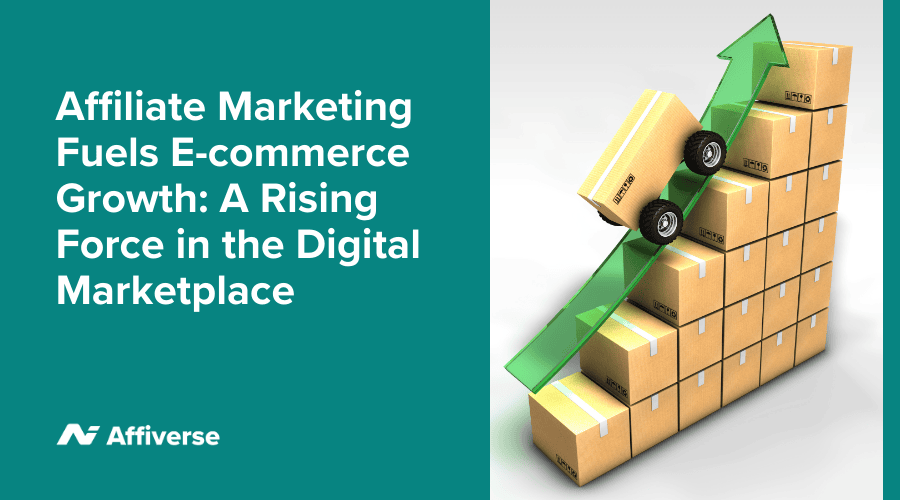Affiliate Marketing Fuels E-commerce Growth: A Rising Force in the Digital Marketplace

Affiliate marketing has quietly become one of the most powerful drivers of e-commerce growth. As more consumers shop online, brands are increasingly turning to affiliate partnerships to expand their reach, build trust, and drive sales. Recent industry insights highlight how affiliate marketing is no longer just a side strategy – it’s now a core component of e-commerce success.
For brands and marketers, understanding how affiliate marketing fuels growth can open new opportunities for sustainable revenue and long-term customer relationships.
The growing role of affiliate marketing in e-commerce
Affiliate marketing is a performance-based model where businesses reward affiliates – such as bloggers, influencers, and websites – for driving traffic or sales through referral links. This approach has gained momentum in recent years due to its cost-effectiveness and scalability.
In a crowded digital market, affiliate marketing stands out because it delivers results. Brands only pay commissions when desired actions, like purchases or sign-ups, occur. This makes it an attractive option for both large retailers and smaller businesses looking to maximise their marketing budgets.
The global rise in e-commerce has only amplified the impact of affiliate marketing. As online shopping becomes the norm, brands are seeking new ways to stand out and reach consumers who are overwhelmed with choices. Affiliates help brands cut through the noise by promoting products to engaged, niche audiences.
Why affiliate marketing works for e-commerce
Affiliate marketing succeeds because it aligns the goals of brands and their partners. Affiliates are motivated to create content that resonates with their audience, knowing they will earn commissions from the sales they generate. This creates a more authentic and trusted form of advertising compared to traditional paid media.
Several factors contribute to its effectiveness in e-commerce:
- Trust and Authenticity: Affiliates, particularly influencers and bloggers, often have strong relationships with their audiences. Their product recommendations feel more genuine than traditional ads, leading to higher engagement and conversions.
- Cost-Effective Growth: Since brands only pay for actual sales or leads, affiliate marketing minimises risk and offers a clear return on investment. It’s an ideal strategy for brands looking to grow without overspending on upfront marketing costs.
- Scalability: Affiliate marketing can easily scale. Brands can work with a few affiliates or expand to hundreds globally, adapting to growth without dramatically increasing costs.
- Diverse Traffic Sources: Affiliates operate across various channels – social media, blogs, YouTube, and more – giving brands access to different audience segments. This diversification helps reduce reliance on a single marketing channel.
E-commerce brands leading the way
Major e-commerce players like Amazon, eBay, and Shopify have long recognised the value of affiliate marketing. Amazon’s Associate Programme, for example, allows content creators and website owners to earn commissions by linking to millions of products.
However, it’s not just the giants benefiting from affiliate marketing. Direct-to-consumer (DTC) brands and niche e-commerce retailers are increasingly turning to affiliate partnerships to grow their businesses. Beauty, fashion, fitness, and tech brands, in particular, are thriving by collaborating with influencers and content creators who align with their target audiences.
Subscription-based services and digital products are also leveraging affiliates to drive sign-ups. From meal kit deliveries to streaming services, brands are using affiliate partnerships to tap into engaged user communities.
Trends shaping the future of affiliate marketing
Affiliate marketing continues to evolve alongside e-commerce trends. Brands and marketers must stay ahead by adapting to new technologies and consumer behaviours.
- Influencer-Driven Commerce: Influencers play an even larger role in affiliate marketing as platforms like Instagram, TikTok, and YouTube introduce more shopping features. Brands are leveraging influencer partnerships to create authentic product placements that drive sales.
- Mobile Commerce (M-Commerce): With more consumers shopping on mobile devices, affiliates are focusing on mobile-first strategies. This includes using social media apps, mobile-optimised websites, and shoppable content to engage users on the go.
- Content Commerce: Blogs, review sites, and niche content platforms are blending editorial content with affiliate links. This seamless integration of content and commerce helps brands reach consumers who are actively researching products.
- AI and Automation: Brands are using AI-driven tools to identify high-performing affiliates, optimise commission structures, and personalise marketing messages. Automation also helps brands scale their affiliate programmes more efficiently.
Challenges to overcome
Despite its growth, affiliate marketing isn’t without challenges. As the industry expands, brands must ensure they maintain control over their affiliate partnerships and safeguard their reputation.
- Compliance and Fraud: Affiliate fraud, such as cookie stuffing or misleading promotions, remains a concern. Brands need robust monitoring systems to detect and prevent fraudulent activity.
- Attribution Complexity: With multiple touchpoints in the buyer’s journey, accurately attributing sales to the correct affiliate can be tricky. Clear attribution models are essential for fair compensation and programme transparency.
- Regulatory Oversight: Data privacy laws and advertising regulations require brands and affiliates to follow strict guidelines, especially when using consumer data for targeted marketing.
The future of affiliate marketing in e-commerce
Affiliate marketing has become an essential growth engine for e-commerce brands. Its ability to drive targeted traffic, build brand trust, and deliver measurable results makes it one of the most effective strategies in today’s competitive marketplace.
As online shopping habits continue to evolve, brands that invest in strong affiliate partnerships and adapt to emerging trends will be well-positioned for long-term success. Whether through influencer collaborations, content-driven marketing, or innovative technologies, affiliate marketing is set to play an even bigger role in shaping the future of e-commerce.
For brands and marketers, the message is clear: affiliate marketing isn’t just a supplementary strategy – it’s a powerful tool for sustainable growth in the digital marketplace.






